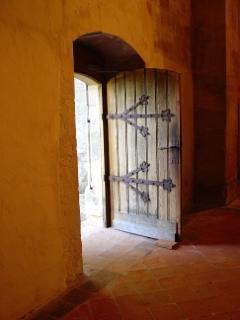Writing and Healing Prompt: Opening the Door of Mercy

Last week I shared and analyzed an essay with my sophomores: “Opening the Door of Mercy,” an essay by Karen Round published as part of the “This I Believe” series on NPR. I couldn’t resist discovering the vivid language in her essay and rearranging it into a found poem, something I’ve discovered is helping me read more closely—and attend to language and form.
So. . . here are her words rearranged on the page, a kind of distillation of the essay.
The sky darkening.
The silhouette of a woman sagging on our threshold.
Our location forces difficult choices.
Wisdom advises
to act a Good Samaritan is to be naïve,
risk terrible consequences.
But when someone approaches, I have to decide:
Is my own safety always
the most important consideration?
Must I fear all whom I don’t know?
Do I help or not?
I believe repeatedly rejecting others
who need help
endangers me.
So here where we live
on that afternoon one summer
when the woman was sinking like the sun on my front porch,
I made my choice.
I opened the door.
We discussed in class how this essay could become a kind of mentor text or catalyst—finding that moment or series of moments in one’s life where a choice had to be made—and then using that choice to begin an essay—and, in so doing, to find ways to bring other readers in, to recognize and write our way towards the notion that we are all often facing similar kinds of choices.
Like this choice: when a stranger arrives at our threshold, do we open the door or not?
(And how do we balance wisdom and compassion when we’re making such choices?)
This essay also puts me in mind (yet once again) of Rumi’s poem about the guest house and the way that outer guests and inner guests can mirror each other and correspond. (I’m beginning to suspect this poem by Rumi can connect to many, many things.)
This being human is a guest house.
Every morning a new arrival.
A joy, a depression, a meanness,
some momentary awareness comes
as an unexpected visitor.
Welcome and entertain them all!
Even if they’re a crowd of sorrows,
who violently sweep your house
empty of its furniture,
still, treat each guest honorably.
This could lead to yet another writing idea: Who or what is waiting at the threshold? Is now the right time—or not—to open the door? What might happen if one did?
_________________________________________________
See also:
